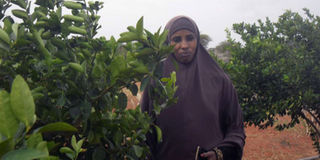Where dry weather is no hindrance to farming

Habiba Mohammed in her fruit farm in the village of Bangal in Wajir County. Ms Mohammed uses mulch and compost manure with the aim of not only conserving water, but also to maintain soil fertility. PHOTO | BERNADINE MUTANU | NATION MEDIA GROUP
What you need to know:
- Wajir is one of the regions in Kenya that has been badly affected by extreme weather.
- Habiba currently has 300 pawpaw trees, lemons and water melons. After every three months, she is assured of at least Sh300,000 from sale of lemons alone, and Sh400,000 from paw paws every year.
- To conserve water, she uses drip irrigation on some sections of her farm, despite the associated cost. She has five overhead tanks which distribute water.
- Irrigation-farming is a sure bet to tackling poverty and lack of food.
While arguments whether it is time for pastoral communities to settle down and adopt modern farming methods to deal with effects of extreme weather rage on, 35-year-old Habiba Mohammed has already made her choice.
In a vast, dry region where water is scarce and drought is the norm, the mother of seven has adopted irrigation agriculture.
Now she not only supplies fresh produce to Wajir town and its environs, she is also an employer and a model farmer in the village of Bangal.
Her farm is used as a case study in bid to encourage area residents to diversify since Wajir is one of the regions in Kenya that has been badly affected by extreme weather.
While many pastoralists have lost their livestock to drought over the years, Habiba is not regretting the decision she made eight years ago.
Habiba’s passion for farming started at a young age. “Farming is my passion, and I got it from my father. When I came here, there were no farms,” she says.
Now she is reaping big ever since her ‘discovery’ that irrigation agriculture is the way to go in the region.
She has dedicated two and half acres of her 20-acre farm to crop husbandry and from the figures, it is clear she is on to something special.
Habiba currently has 300 pawpaw trees, lemons and water melons. After every three months, she is assured of at least Sh300,000 from sale of lemons alone, and Sh400,000 from paw paws every year.
She has also set up a green house where she plants tomatoes and other perishables for local consumption and time after time plants water melons.
“I supply the perishables and it is not enough, I cannot satisfy the local market,” she says.
The huge profits did not start coming until she improved her farming methods. Through the assistance of a non-governmental organisation, Mercy Corps, which saw her hard work and enthusiasm in farming, she was given a solar powered pump which she uses to pump water from one of her three wells.
TACKLING POVERTY AND FOOD INSECURITY
To conserve water, she uses drip irrigation on some sections of her farm, despite the associated cost. She has five overhead tanks which distribute water.
“The solar pump has increased my yields. Before I could get between Sh20,000 and Sh50,000 per harvest,” she says.
She has subdivided her land to optimally utilise it and because it is expansive she leaves some of the sections fallow.
In addition, Ms Mohammed uses mulch and compost manure with the aim of not only conserving water, but also to maintain soil fertility.
But undertaking is not without challenges, “Because of the salinity of the water, the drips and pipes have to be changed regularly. This is in addition to the fact that water levels sometimes go down because of drought,” she says.
A pipe long enough to supply water in the whole farm costs Sh15,000 while a drip kit for a three-quarter farm is Sh34,000.
Habiba used Sh60,000 to sink each well. She still uses diesel to pumps in two wells but hopes to install other solar pumps.
Previously, pastoralists would graze livestock in her farm and would destroy her crops since land in that region is communal and was not fenced, despite having bought it at Sh1 million in 2012.
This is because she also cultivates fodder for her eight cattle and four Toggenburg goats which provide milk for her and her family. The conflict was, however, solved amicably five years ago after elders intervened.
The entrepreneur has four farmhands of whom one is on a permanent basis.
And with the need to monitor weather and market, Ms Mohammed uses mobile phone applications to know commodity prices, market forces as well as get weather updates.
“Irrigation-farming is a sure bet to tackling poverty and lack of food,” she says.



